For the last three months, poker fans have expressed concern about the future of Poker TV, given the events that transpired on Black Friday. With a full season of poker playing between that time and now, we have a clearer picture of what will become of Poker TV. Full Tilt is currently down and no longer offering advertising (and likely won’t be advertizing in the US anymore, even if they do recover) and PokerStars has been forced out of the American market, to be followed by the voluntary withdrawal of other sites, such as Bodog Poker, who have simply decided that operating in the US is more trouble than it’s worth.
As we all know, the World Series of Poker continues to be aired on ESPN, and the station is currently showing highlight reels that they plan to air through November, when the final table returns to finish out the 2011 WSOP and crown a champion. ESPN doesn’t seem to have any intention of letting go of this cash cow, as plenty of people have tuned in to both the live play and the highlights. The World Poker Tour, which airs on Fox Sports Net will likely also stay on the air, due to high viewer volume (and no sponsorships from companies that are currently at odds with the US). The European Poker Tour and North American Poker Tour, however, have both been pulled from television. They were allegedly timebuy deals, and almost all the timebuys have been removed from network television.
Timebuys, also known as brokered television, are when a company buys a time slot outright, rather than trying to earn income either through the network or through advertising. These types of shows often don’t make enough money through ads to be worth trying to air the traditional way, so when the company paying to air the show no longer has any reason to air it, the show is taken off the air. When PokerStars was shut out of the US market, it no longer had any motivation for paying millions of dollars to keep televising the EPT and NAPT, as Americans now had no way of accessing the site, therefore removing the shows’ efficacy as an advertising tool. PokerStars therefore pulled the plug.
Several other shows that are still being aired, such as High Stakes Poker and Poker After Dark are also running on timebuys, which means that they’re in serious jeopardy of being taken off the air after the current season, as the sponsor has no reason to keep funneling money into them (and in the case of Poker After Dark, the main sponsor was Full Tilt, which will probably not be sponsoring anything for a while). It’s anyone’s guess which shows will still be around a year– or even six months– from now.
Not all is lost, however. This fall, Epic Poker League will be coming to CBS and Velocity, a new network that was previously Discovery’s High-def Theater Network. Between the two networks, the latter of which won’t go live until early October of this year, 20 hours of programming will be aired. Because many of the other poker shows have gone under, Epic Poker League, led by poker legends Annie Duke and Jeffrey Pollack, stands to draw the professional players who will no longer be playing for other Poker TV shows. With a monopoly on the televised poker talent, Epic Poker League may well be what the foundering Poker TV has been looking for.
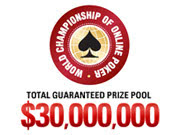 The World Championship of Online Poker (WCOOP) returns for a tenth year to PokerStars this September. This year’s championship will certainly live up to its excellent reputation as one of the biggest annual poker events and the highlight of many online players’ years. With 62 events and $30 million in prizes guaranteed, players have plenty of reason to forget the trouble that PokerStars has seen previously this year and focus instead on the positive. The main event is standard No-Limit Hold’em, and it will have a $5 million prize pool, with $1 million going to the lucky first place winner. In addition to this hefty sum, the first place winner will also get packages for the EPT Grand Final and 2012 PCA and a 2012 SCOOP seat, among other things.
The World Championship of Online Poker (WCOOP) returns for a tenth year to PokerStars this September. This year’s championship will certainly live up to its excellent reputation as one of the biggest annual poker events and the highlight of many online players’ years. With 62 events and $30 million in prizes guaranteed, players have plenty of reason to forget the trouble that PokerStars has seen previously this year and focus instead on the positive. The main event is standard No-Limit Hold’em, and it will have a $5 million prize pool, with $1 million going to the lucky first place winner. In addition to this hefty sum, the first place winner will also get packages for the EPT Grand Final and 2012 PCA and a 2012 SCOOP seat, among other things.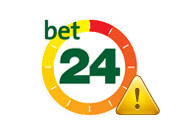 Bet24, the online sportsbooking and poker site, has announced Monday that they were the target of a security breach. The company sent out an email to its current and past customers letting them know that some of their personal information may have been compromised. While this is becoming more and more common of late, especially with the Sony scandal a few months ago, what’s particularly unique about the case with Bet24 is that they were hacked in December 2009… and they’re just now telling customers about it, some 19 months later.
Bet24, the online sportsbooking and poker site, has announced Monday that they were the target of a security breach. The company sent out an email to its current and past customers letting them know that some of their personal information may have been compromised. While this is becoming more and more common of late, especially with the Sony scandal a few months ago, what’s particularly unique about the case with Bet24 is that they were hacked in December 2009… and they’re just now telling customers about it, some 19 months later.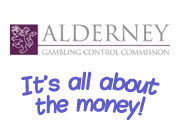 Full Tilt lawyer Martin Heslop began today’s hearing by requesting a private hearing to determine whether the AGCC would adjourn the proceedings until later. Although he claims that this was not due to Full Tilt’s attempts to hide anything from their players, but rather to respect the delicacy of the situation with the mysterious, unnamed buyer/investor, especially given the media frenzy surrounding this case, a lot of people are skeptical. After Heslop’s request, professional poker player Harry Demetriou stood up and shouted, “What about the interests of the players? Why are you protecting this corrupt company?” He was removed from the courtroom, but not before many other people in the audience could mirror their support of his statement.
Full Tilt lawyer Martin Heslop began today’s hearing by requesting a private hearing to determine whether the AGCC would adjourn the proceedings until later. Although he claims that this was not due to Full Tilt’s attempts to hide anything from their players, but rather to respect the delicacy of the situation with the mysterious, unnamed buyer/investor, especially given the media frenzy surrounding this case, a lot of people are skeptical. After Heslop’s request, professional poker player Harry Demetriou stood up and shouted, “What about the interests of the players? Why are you protecting this corrupt company?” He was removed from the courtroom, but not before many other people in the audience could mirror their support of his statement.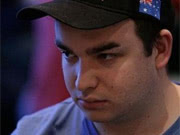 In addition to his remarkable rise to fame, Chris Moorman has some other special talents under his belt. At this year’s World Series of Poker, he’s currently in fourth place in the Player of the Year race– not close enough to challenge Ben Lamb or Phil Hellmuth, who are leading the pack, for the title, but well enough to make a good showing and keep his name circulating among poker players and aficionados. It’s not just name recognition that Moorman managed to take home from the 2011 WSOP, however; he also left with over a million dollars in prize money (which may seem insignificant when compared to the over 7.5 million that he’s garnered through online play).
In addition to his remarkable rise to fame, Chris Moorman has some other special talents under his belt. At this year’s World Series of Poker, he’s currently in fourth place in the Player of the Year race– not close enough to challenge Ben Lamb or Phil Hellmuth, who are leading the pack, for the title, but well enough to make a good showing and keep his name circulating among poker players and aficionados. It’s not just name recognition that Moorman managed to take home from the 2011 WSOP, however; he also left with over a million dollars in prize money (which may seem insignificant when compared to the over 7.5 million that he’s garnered through online play).  Nicky Evans isn’t quite the success story that Moorman is, but he still plays a solid game: solid enough to earn him over a million dollars since he went pro a couple of years ago. Like his fellow Lock Poker recruit, Evans started playing poker in university, but Evans’ game was a purely live one, playing first with fellow students and then at the small tables at the casino close to his school. After university, he headed to Canada, where he played at a casino in Niagra Falls when he wasn’t working. He would soon meet a sponsor, and the rest, as they say, is history. Under the tutelage of James Dempsey, Evans would begin to win every live tournament he encountered, but things changed when he made the transition to an online game. It would take some time (and a new backer) before Evans was successful online.
Nicky Evans isn’t quite the success story that Moorman is, but he still plays a solid game: solid enough to earn him over a million dollars since he went pro a couple of years ago. Like his fellow Lock Poker recruit, Evans started playing poker in university, but Evans’ game was a purely live one, playing first with fellow students and then at the small tables at the casino close to his school. After university, he headed to Canada, where he played at a casino in Niagra Falls when he wasn’t working. He would soon meet a sponsor, and the rest, as they say, is history. Under the tutelage of James Dempsey, Evans would begin to win every live tournament he encountered, but things changed when he made the transition to an online game. It would take some time (and a new backer) before Evans was successful online.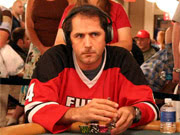
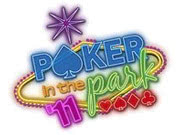 If you’re looking for a way to pass the time in Europe before the World Series of Poker Europe events begin, look no further. Poker in the Park, Europe’s largest poker festival, will be held September 2nd and 3rd at Hanover Square in London. This new location is near the Oxford Circus Station, and this year’s event is absolutely free to anyone over the age of 18, so why not come out and play some poker and learn from the pros? Last year’s event drew 20,000 poker fans from all over the UK and elsewhere, with all the extras being added to this year’s lineup, the 2011 Poker in the Park will be the biggest yet!
If you’re looking for a way to pass the time in Europe before the World Series of Poker Europe events begin, look no further. Poker in the Park, Europe’s largest poker festival, will be held September 2nd and 3rd at Hanover Square in London. This new location is near the Oxford Circus Station, and this year’s event is absolutely free to anyone over the age of 18, so why not come out and play some poker and learn from the pros? Last year’s event drew 20,000 poker fans from all over the UK and elsewhere, with all the extras being added to this year’s lineup, the 2011 Poker in the Park will be the biggest yet!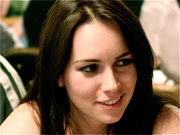 If you’re new to poker or you’re uneasy about taking your game against big names in poker just yet, fear not– Poker in the Park is more than equipped to help you learn the game or improve your playing. Swing by the Poker Pros’ Lecture Marquee for lectures (five on each day of the event) from famous poker players, or sit down with the pros at the Live Tuition Marquee and let them analyse your game and tell you what you’re doing wrong (or right!). Some of last year’s celebrity poker players included Annette Obrestad, Jamie Gold, Liv Boeree, and Peter Eastgate, and while the 2011 lineup isn’t announced yet, one thing is for certain– this experience could improve your poker game forever!
If you’re new to poker or you’re uneasy about taking your game against big names in poker just yet, fear not– Poker in the Park is more than equipped to help you learn the game or improve your playing. Swing by the Poker Pros’ Lecture Marquee for lectures (five on each day of the event) from famous poker players, or sit down with the pros at the Live Tuition Marquee and let them analyse your game and tell you what you’re doing wrong (or right!). Some of last year’s celebrity poker players included Annette Obrestad, Jamie Gold, Liv Boeree, and Peter Eastgate, and while the 2011 lineup isn’t announced yet, one thing is for certain– this experience could improve your poker game forever!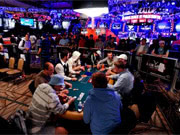 We’re now down to the November Nine here at the 2011 World Series of Poker Main Event. This is the moment that everyone has been waiting for– the final table is set, and there will be, in four long months, a new WSOP champion. Because the action of the day has been so intense and every elimination counts as we moved from 22 remaining players to just nine, we’re going to give you a play-by-play of eliminations.
We’re now down to the November Nine here at the 2011 World Series of Poker Main Event. This is the moment that everyone has been waiting for– the final table is set, and there will be, in four long months, a new WSOP champion. Because the action of the day has been so intense and every elimination counts as we moved from 22 remaining players to just nine, we’re going to give you a play-by-play of eliminations.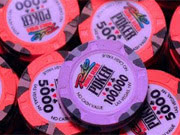 Many of the professional players left in this year’s WSOP were eliminated on Day 7, but the remaining competitors are not short on talent. Hitting the felt on Day 7 were Sebastian Ruthenberg, JP Kelly, Erick Lindgren, Andrew Brokos, Tony Hachem, last-woman-standing Erika Moutinho, and Steve Brecher.
Many of the professional players left in this year’s WSOP were eliminated on Day 7, but the remaining competitors are not short on talent. Hitting the felt on Day 7 were Sebastian Ruthenberg, JP Kelly, Erick Lindgren, Andrew Brokos, Tony Hachem, last-woman-standing Erika Moutinho, and Steve Brecher.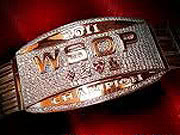 Day 6 of the 2011 World Series of Poker Main Event has been a nail-biter, offering up more excitement than any of the previous days during this event. We went from 142 players to 57 on this most recent day of action, and with these eliminations came several levels of increases in payouts– while the players who went home today may be disappointed that they didn’t nab the bracelet, most will be poud that they managed to make a substantial money finish in the world’s largest poker competition.
Day 6 of the 2011 World Series of Poker Main Event has been a nail-biter, offering up more excitement than any of the previous days during this event. We went from 142 players to 57 on this most recent day of action, and with these eliminations came several levels of increases in payouts– while the players who went home today may be disappointed that they didn’t nab the bracelet, most will be poud that they managed to make a substantial money finish in the world’s largest poker competition.